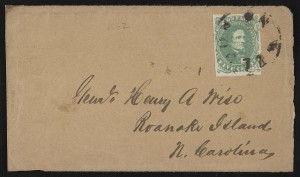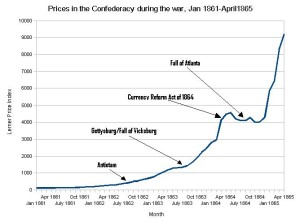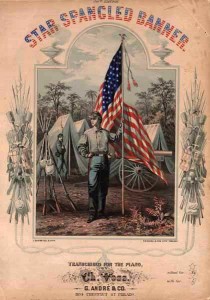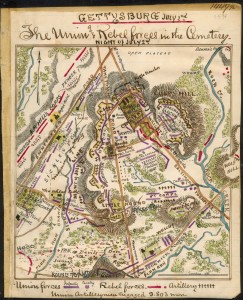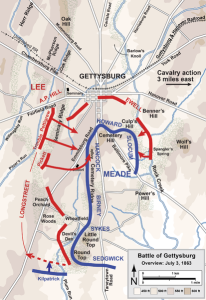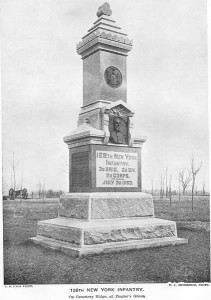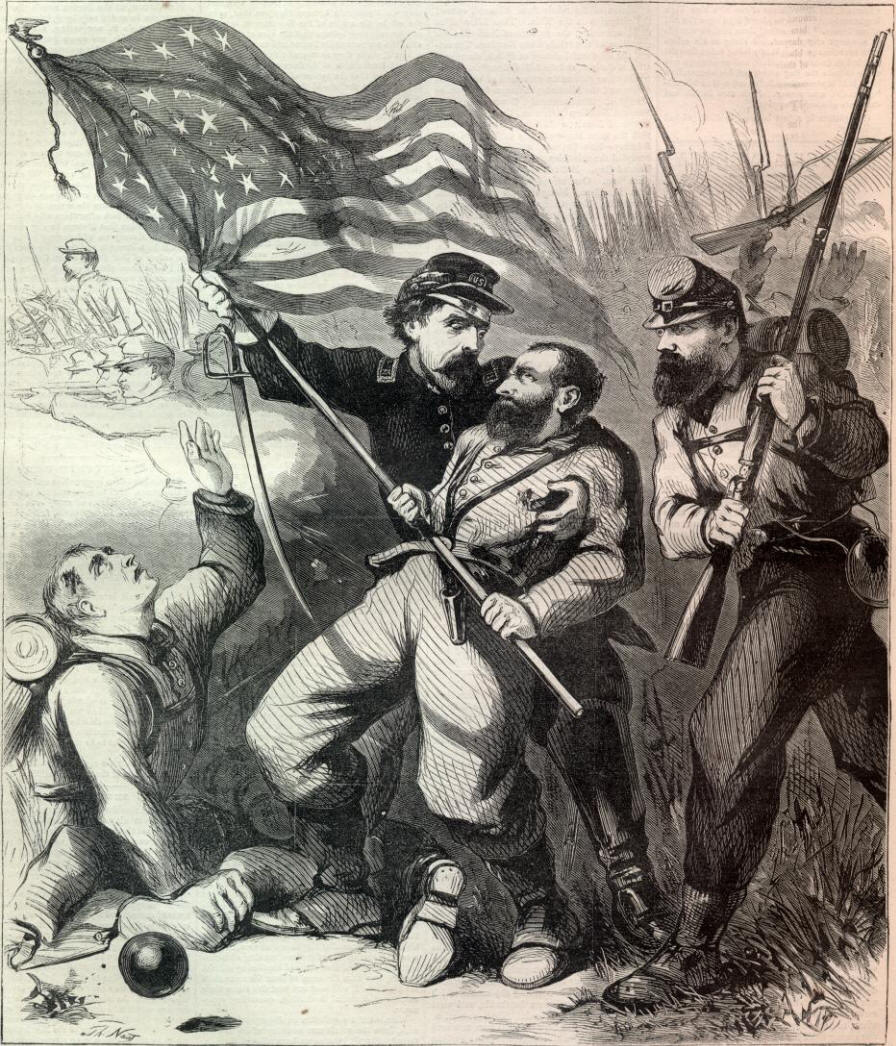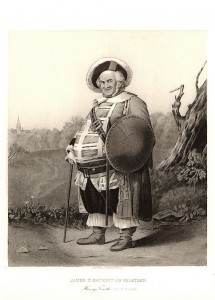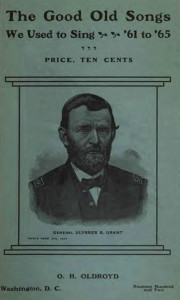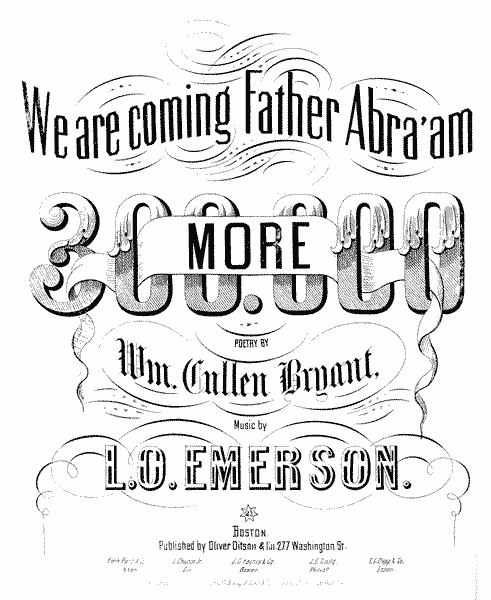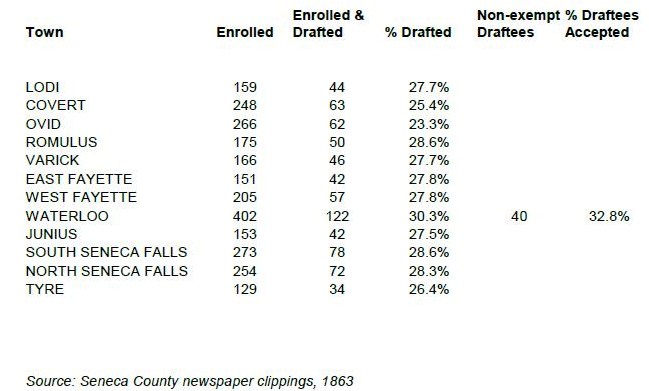150 years ago yesterday the draft resumed peaceably in New York City. Army, militia, and police forces were present in large if unostentatious numbers. A reorter found “no less than seven huge columbiads on trucks in the depot of the New-Jersey Central Railroad, as though they had just been brought from the interior.” The names were drawn by a certified blind man who also had a bandana covering his eyes – just to make sure. All 1100 names drawn were listed in this article from The New-York Times August 20, 1863:
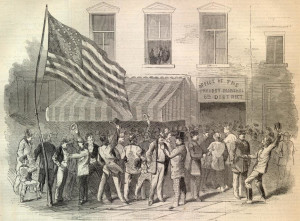
“RESUMPTION OF THE DRAFT—OUTSIDE THE PROVOST MARSHAL’S OFFICE, SIXTH DISTRICT—THE CROWD CHEERS. “
THE DRAFT.; Proceedings Yesterday in the Ninth Ward. No Attempt at Disturbance. The Names of the Drafted. Scenes and Incidents Inside and Outside.
In conformity with the notice given in the TIMES the renewal of the Draft was commenced yesterday morning, at 10 o’clock. It was generally known in the community that the National, State and Municpal authorities had made every possible preparation which could insure quiet and order, and prevent disturbance of any nature. Nevertheless, in consequence of the deep interest felt in the procedure by every man, woman and child in the City, a grea excitement was evidently pervading the people, and an anxiety in no degree feigned rested upon every mind. The Provost-Marshal-General, with admirable sagacity, selected the quiet Sixth District in which to commence the renewal, a District which is noted for its good order. At an early hour the Sixth-avenue, in the immediate neighborhood of Capt. FARR’s Headquarters, was crowded with people of every grade of life. All sorts and conditions of men were there, and although perfect order reigned, arguments pro and con the Draft were liberally entered into.
HEADQUARTERS.
The Headquarters are situated at No. 185 Sixth-avenue, and occupy the whole of the building, with the exception of the ground floor, The second floor is used as a series of offices for the Provost-marshal and Assistants, while the remainder of the building is used temporarily as barracks for the Guards. In front of the office waves the Star Spangled Banner while from the windows, depend in graceful festoons and patriotic drapery.
The room in which the drawing took place is large and airy, admirably adapted to the purpose. One-third of it is used by the officers and reporters, the rest, which is railed off by a stout wooden fence, being occupied by those who desire to witness the proceedings and “tremble while they hear.”
Upon a central table is placed the wheel of destiny, while at several adjacent tables and desks are placed seats for the official recorders.
All about the outside doorway were gathered great crowds of people; also a strong detachment of the Metropolitan Police, who looked as if they were ready and willing to add another chapter to “their honorable record.” Through the line of policemen no one was permitted to pass after the room up-stairs was filled. The stairway, the corridors, the various approaches to the room were filled with restless, anxious unable-to-see individuals, who continually stepped on each others’ toes, punched each others’ ribs and wasted each others’ patience. …
The military were prudently kept from sig[h]t, and passed their time monotously in the rooms above waiting for something to turn up; but they waited in vain.
At a little after 10 o’clock, Capt. FARR, accompanied by a blind man, whose altitude cannot vary much from seven feet, promenaded the office, after which the blind man took the oath and signed his name to the official declaration of support to the Government. Capt. FARR then announced that all things were ready, and that the “proceedings would now begin.”
THE DRAFTING.
The order from President LINCOLN was read, which, among other items, specifies the quota from the Sixth District to be, by Wards, as follows: First Sub-District, (Ninth Ward,) 1,100; Second Sub-District, (Fifteenth Ward,) 794; Third Sub-District, (Sixteenth Ward.) 1,181, which number includes the 50 per cent, additional to offset the anticipated exemptions.
Upon the table were placed several boxes containing the ballots, each one of which was enveloped in as India rubber band. These were counted, under the supervision of Alderman CHIPP, J.W. BOOTH, Esq., and JOSEPH D. BALDWIN, Esq., by Messrs. W.L. STEPHEN and CHARLES OAKLEY. It was announced by Alderman CHIPP that the number of ballots put in the boxes was 7,708, but the number-as counted showed but 7,698.
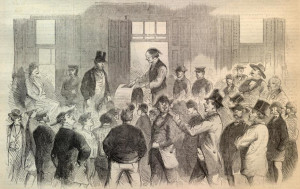
“RESUMPTION OF THE DRAFT—INSIDE THE PROVOST MARSHAL’S OFFICE, SIXTH DISTRICT—THE WHEEL GOES ROUND. “
The draft was next in order, and Commissione LAMONT announced that he would turn the wheel, the blind man CONKLIN BISHOP would draw the ballots, and Mr. SAMUEL F. SLEIGHT would read the names. The best of order and of good nature reigned throughout the room, and when the blind man was rendered entirely safe by means of a red and white bandanna, which was closely bound about his temples, the jocularity approached the tumultuous, and it was deemed proper by the ever active Policemen to suggest quiet. The wheel revolved, the blind man groped, the reader announced, and WILLIAM R. BIRDSALL was a conscript. Hearty guffaws and boisterous cheers followed the reading of the name, and various salutations greeted the recipient of Uncle Sam’s attention, so much so in fact that Capt. FARR mounted the table and informed the people that if that sort of thing continued he would be under the painful necessity of clearing the room; after which there was order for several minutes, and the drafting went on.
During the day no incident worthy of note occurred; everything was well done and passed off decently and in order. …
As name after name was announced to the multitude on the avenue, the comments were many and various, most of them, however, hilarious and good-humored. The undrafted had their fun out of the “elect” whom they intimately knew or even recognized. Very frequently, however, the biter was bitten, for just as some dry wit among the multitude had rallied his neighbor, inquiring whether, “now that he was one of Uncle ABE’s heroes, he would speak to common people any more,” his own title and cognomen would be bandied forth with a shout, and the “funny fellow” sneak off with an altered countenance to remedy one draft with another in perhaps both senses of the word. …
The Police were, as usual, on their beats, and seemed to be perfectly cool and secure, while it was evident to the experienced eye that the secret branch of their service was in full activity on all sides, carefully noting the popular undertow, and scenting out the faintest aroma of treason. As the day wore on, and no ticsin startled the town from its propriety, as commerce went its way undisturbed, and even the sensation bulletin boards looked dull and sleepy, everybody came to the conclusion that the hydra-headed monster of revolt was this time completely cowed, and finding “discretion the better part of valor,” did not dare to lift his front or even “mildly as a sucking dove.”
With night came the complete assurance of tranquility, and the draft in New-York was safely born. At midnight the only remonstrance heard in the streets was the last mournful cry of the vendors of “hot corn.” …
The two images were published in the September 5, 1863 ofHarper’s Weekly at Son of the South. Here’s a paragraph from the report in Harper’s that notes the changed demeanor on the streets:
Nothing could be more striking than the contrast between the city as it raved upon the four black days of July and as it smiled during the 19th day of August and the subsequent days of the resumed draft. Men who were gorillas when the black days were upon us, appeared, by comparison, to have become converted into very affable gentlemen. If you walked the highways and by-ways of the city on the morning of Wednesday, the 19th of August, it was at no peril of life or limb, as it most certainly would have been on Wednesday, the 15th of July. The gorilla appeared to have gone out of town. The swift and even-handed justice that has lately presided over affairs in the Recorder’s Court had certainly some little influence in bringing about this reform. So had the suggestive howitzer.

